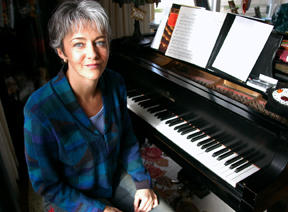Despair has never sounded so good.
Tragedy and opera go hand in hand, and soprano Carol Willis Buechler brings both to this weekend’s Bainbridge Orchestra concert.
Buechler sings the parts of Semele, a Phoenician princess abducted by Jupiter in George Frideric Handel’s “Semele” (1743), and Dido, Queen of Carthage, abandoned by her lover in Henry Purcell’s “Dido and Aeneas” (1689).
For Buechler, singing arias under conductor Sandi Schwarz’ direction is a rare chance to learn.
“Usually I’m the leader,” said Buechler, who teaches voice for the Voice Gallery and West Sound Academy. “I tend to take the director role in music presentation, perhaps because I’m a teacher.
“One of the wonderful things about Sandi is that she knows more about baroque chamber music than I do. She has studied it, she has played it, and she fully understands it.”
In both works, Schwarz, a nationally noted specialist in baroque and early music performance practice, leads a chamber ensemble which includes guitarist Justin Davis and cellist Barbara Deppe.
In “Dido” the voices are joined by a small string ensemble.
On the program, Schwarz brackets the Purcell and Handel arias with Purcell funeral music written for brass, playing through all four works without applause.
“I’ve loved the Dido lament and the Semele aria since I was a teen,” Schwarz said. “It’s heavenly music, and it’s framed here because I am opening with brass funeral music Purcell wrote for Queen Mary the Second – the same music played at his own funeral a few months later – and closing with Purcell’s funeral march.”
Buechler says she anticipates singing both the Handel and Purcell in the spirit of the time the music was written.
“Dido and Aeneas,” the first opera in English, was more a showcase for the voice than a fully realized plot, and the vocalist, while using less vibrato than called for in later works, was expected to embellish the spare musical notation, Buechler says.
The rest of the winter program presents the full orchestra in 19th century works by Beethoven, Gounod and Grieg.
“I like to include one baroque piece per concert,” Schwarz said. “Since it is my specialty it is nice to showcase some of that music, but this is a symphonic group so it more appropriate to use the full force.”
Familiar virtuosos
Longtime islanders Buechler and Schwarz each have a history with the Bainbridge Orchestra.
Buechler was a violinist serving as assistant concert master in 1978 and Schwarz, who took up the baton after Kathleen Macferran resigned last spring, was music director of the orchestra in the early 1980s and returned to conduct two concerts for the 1999-2000 season.
Schwarz, long noted as a violinist in the field of early music, has appeared with original-instrument ensembles in Chicago, San Francisco, Portland and other U.S. cities, as well as in Canada, Mexico and Europe. Schwarz is a member of San Francisco’s Philharmonia Baroque Orchestra, and has been a member of Seattle Baroque Orchestra and other orchestras in British Columbia and the East Coast.
Buechler – who says her voice has been dubbed “employable” because she can easily sing both mezzo-soprano and soprano parts – has appeared as a soloist throughout North America and Europe in such venues as Boston’s Old South Church, Carnegie Hall in New York City and the Cathedral of Notre Dame in Paris.
“She is a beautiful singer, with great sensitivity,” Schwarz said. “She’s been wonderful to work with.”
* * * * *
Soprano Carol Willis Buechler joins the Bainbridge Orchestra and conductor Sandi Schwartz for the ensemble’s winter concert, 7:30 p.m. Feb. 22 and 4 p.m. Feb. 23 at the Playhouse.
The program includes selections from George Fridrich Handel’s “Semele” and Henry Purcell’s “Dido and Aeneas”; “Twelve Minuets” by Ludwig van Beethoven; “Funeral March for a Marionette” by Charles Gounod; as selections from Edvard Grieg’s “Peer Gynt.”
Tickets are $15/adults, $9 for seniors and students, available at the Playhouse or by phone at 842-8569. Information: www.theplayhouse.org.


